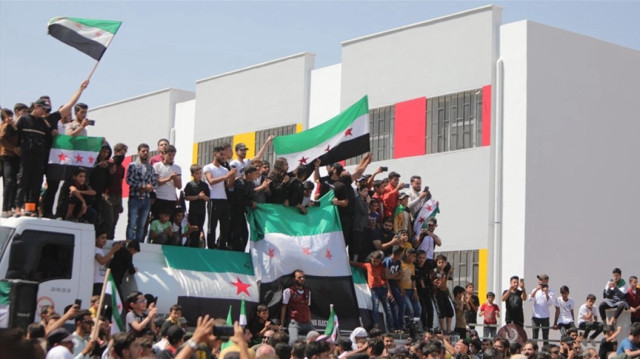
In February 2011, group of teenagers from Daraa wrote ‘Next, it's your turn, doctor' on their school wall, igniting revolution that would last nearly 14 years
In the southwestern Syrian city of Daraa, where peaceful protesters sparked the uprising of 2011, young people now etch their victory over the regime into history with the statement: "The doctor (Bashar Assad) fled."
This was written on the same school wall where, in February 2011, a group of teenagers had scrawled the words, "Next, it's your turn, doctor," marking the start of resistance against the Ba'ath regime.
In 2011, the group of schoolchildren wrote that initial phrase, igniting a revolution that would continue for nearly 14 years. Their arrest and torture by regime security forces triggered widespread protests across the country.
After enduring approximately 45 days of detention and torture by the regime's security forces, the young activists were released. However, the protests they sparked quickly escalated into a nationwide uprising, ultimately leading to civil war. The youth, forced to flee Daraa due to heavy assaults by the regime, sought refuge in Idlib.
Following the collapse of the Ba'ath regime on Dec. 8, 2024, the youth returned to their hometown and visited their former school. They replaced their initial message with the new phrase: "The doctor fled ... 8/12/2024," marking the end of the rule of Bashar Assad, an ophthalmologist.
- 'We have no regrets. We ended a murderous regime'
Muawiya Sayasneh, now 28 years old, one of the teens to write the initial phrase 14 years ago, reflected on the events. Standing outside the school, he recounted their revolutionary act:
"We were just children, but we ignited the spark of the Syrian revolution. Myself, Samer Sayasneh, and Ahmad Irsheidat wrote 'Next, it's your turn, doctor' on this very wall in March 2011. The regime's repression was unbearable — they placed police posts on every street corner. We decided to act, and the next day, security forces detained us."
On the brutal torture during their detention, Sayasneh described methods such as electric shocks, beatings, and suspension. Their families pleading for their release were subjected to vile insults by regime officials, telling them to "forget your children," he said.
These actions sparked widespread protests, with demonstrators carrying olive branches. "They opened fire on peaceful protesters," Sayasneh said, adding, "Despite everything, we are proud of what we did. We have no regrets. We ended a murderous regime."
- Victory after 14 years
Reflecting on the revolution's toll, Sayasneh highlighted the thousands of missing individuals and mass atrocities attributed to the regime.
"They used acid presses and buried people under asphalt. Where are the 70,000 detainees from Sednaya prison? The regime killed them all," he said.
Now, Sayasneh looks forward to rebuilding Syria. "We paid the price for freedom with our blood, but today, Syria is free. God willing, we will rebuild it better than ever."
Samer Sayasneh, another member of the original group, shared his memories from the office where he was interrogated in 2011.
He recounted, "We wrote, 'Next, it's your turn, doctor' on Feb. 15, 2011. The next morning, we were detained and brought to this security office. I was interrogated in this room. Back then, they tortured us, asking why we wrote on the wall and who was behind it."
After his release, Samer joined peaceful protests and later helped form defense groups to protect demonstrators. Wounded in 2012, he received treatment in Jordan.
Today, he celebrates his return to Daraa with his children, saying, "In 2011, we told Assad, 'Your turn is next,' and he laughed, thinking it was a joke.
"Now, in 2024, we wrote, 'The doctor fled.' We have won, and I thank God for this victory."
Assad, Syria's leader for nearly 25 years, fled to Russia after anti-regime groups took control of the capital Damascus on Dec. 8, ending the Baath Party's regime, which had been in power since 1963.
The takeover came after Hayat Tahrir al-Sham (HTS) fighters captured key cities in a lightning offensive that lasted less than two weeks.

